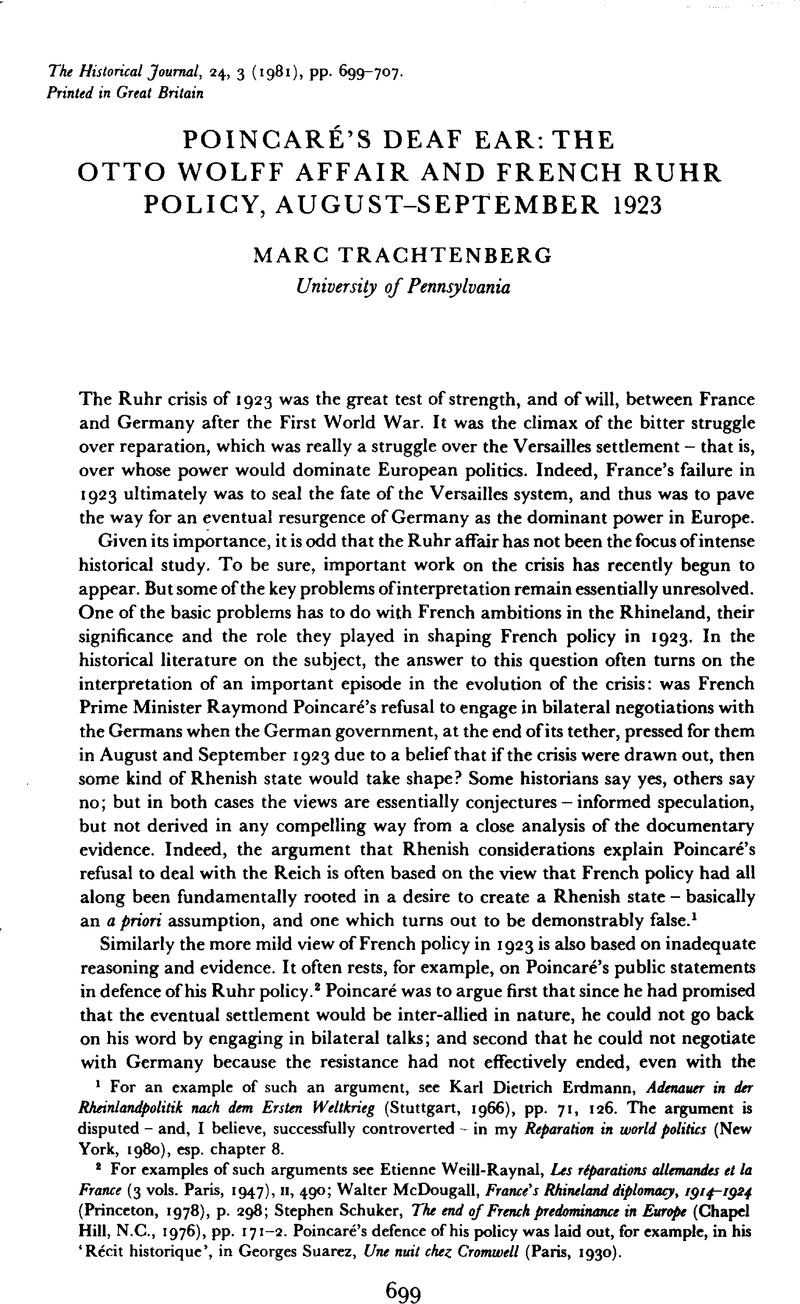Published online by Cambridge University Press: 11 February 2009

1 For an example of such an argument, see Karl, Dietrich Erdmann, Adenauer in der Rheinlandpolitik nach dan Ersten Weltkrieg (Stuttgart, 1966), pp. 71, 126.Google ScholarThe argument is disputed - and, I believe, successfully controverted - in my Reparation in world politics (New York, 1980), esp. chapter 8.Google Scholar
2 For examples of such arguments see Etienne, Weill-Raynal, Les reparations allanandes et la France (3 vols. Paris, 1947), 11, 490;Google ScholarWalter, McDougall, France's Rhineland diplomacy, 1914–1924 (Princeton, 1978), p. 298;Google ScholarStephen, Schuker, The end of French predominance in Europe (Chapel Hill, N.C., 1976), pp. 171–2.Google Scholar Poincaré's defence of his policy was laid out, for example, in his ‘Récit historique’, in Georges, Suarez, Une null chez Cromwell (Paris, 1930).Google Scholar
3 Poincaré to Herbette, 5 Sept. 1923, French Ministry of Foreign Affairs archives, series ‘Europe 1918–1929’, sub-series ‘Ruhr’, vol. 28 - henceforth cited in the form ‘AE, Ruhr, vol. 28’.
4 Margerie to Poincaré, 20 Sept. 1923 (tel. 1235), and Poincaré to Margerie, 21 Sept. 1923 (tel. 742), AE, Ruhr, vol. 29.
5 On these events, see Jacques, Bariety, Les relations franco-allemandes aprés la premiére guerre mondiale (Paris, 1977), pp. 250–5,Google Scholar and McDougall, Rhineland diplomacy, pp. 299–311. For an example of official contempt for the separatists, see Gen. Degoutte's notes of 9 Sept. and 20 Nov. 1923, in Degoutte, , Inoccupation de la Ruhr (Dusseldorf, 1924), Rapports politiques. Only a limited number of copies of this secret report were published; over 3,000 pages of annexed documents provide very valuable material. There is a copy in the library of the War Ministry archives at Vincennes. Henceforth it will be cited as ‘Degoutte report’; ‘PA’ (‘Piéce Annexe’) will refer to the number of the annexed document cited.Google Scholar
6 ‘Note pour le president du conseil’, n.s. 5 Feb. 1923, AE, Relations Commerciales, vol. 144; Margerie to Poincaré, 22 Feb. 1923, AE, Relations Commerciales, vol. 146; Seydoux, ‘Note pour le president du conseil’, 15 Mar. 1923, and Genoyer to AE, 16 Mar. 1923, AE, Relations Commerciales, vol. 334 (for Schacht and Wolff overtures); Poincare to Tirard, 18 Mar. 1923, box AJ9 3296, Archives Nationales, Paris, for Poincare's refusal to engage in talks with the industrialists.
7 ‘Degoutte report, pp. 409–14; Poincaré's instructions of 20 Aug. are quoted extensively on pp. 412–14; ‘Note au sujet de la reunion qui eut lieu le 30 juillet au cantonnement de Gladbeck’, n.a., n.d., Degoutte report, PA 738; ‘Compte Rendu special des renseignements’, n.d. [4 Aug. 1923], Degoutte report, PA 748; (Seydoux), “Note pour le président du conseil”, 6 Aug. 1923, AE, Relations Commerciales, vol. 150.
8 Degoutte report, p. 294.
9 ‘ Denvignes to Degoutte, 1 Aug. 1923, Degoutte report, PA 741.
10 Denvignes to Degoutte, 6 Aug. 1923, Degoutte report, PA 752.
11 ibid..
12 Denvignes to Degoutte, 13 Aug. 1923, Degoutte report, PA 768; Compte rendu du chef du 2e Bureau, 14 Aug. 1923, Degoutte report, PA 772.
13 Denvignes to Degoutte, 17 Aug. 1923, Degoutte report, PA 786.
14 On this see my Reparation in world politics, ch. VII, section 5.
15 Chef du 2C Bureau (Lt. Dumont), ‘ Compte-Rendu No. 4 d’un entretien ayant lieu le 16 Aoüt 1923 avec Monsieur von Metzen’, 17 Aug. 1923, Degoutte report, PA 767. In this document the banker is called ‘Monsieur X’. He is identified as Griess in Dumont's ‘Compte-Rendu No. 6’, 24 Aug. 1923, Degoutte report, PA 806, and in the Degoutte report, p. 417.
16 Denvignes to Degoutte, 17 Aug. 1923, Degoutte report, PA 786.
17 Thus the references to Wolff in the two volumes on the Stresemann government in the Akten der Retchskaniln Weimarer Republik series (Erdmann, Karl D. and Vogt, Martin, eds., Die Kabinette Stresemann Iu. II [Boppard am Rhein, 1978])Google Scholar reveal no trace of a suspicion that Wolff was in any way linked to Rhenish separatism. Wolff, of course, had always taken a patriotic line in dealings with the central government. See for example document no. 30 in this collection, his ‘ Aufzeichnung iiber eine Unterredung Otto Wolffs mit General Degoutte am 29. August 1923’, 1, 142–4, and also Gustav, Stresemann, Vermäkhtnis: Der Nachlass in drei Bänden, ed. Bernhard, H. (Berlin, 1932), 1, 94–5.Google Scholar
18 Degoutte to Poincaré, 18 Aug. 1923, quoted in Degoutte report, pp. 420–3.
19 Poincaré to Degoutte, 25 Aug. 1923, Degoutte report, p. 423.
20 Poincaré to Degoutte, 25 Aug. 1923, Degoutte report, p. 424 and PA 811; also in AE, Relations Commerciales, vol. 344. Tirard was the French high commissioner in the Rhineland.
21 Margerie to Poincaré, 1 and 5 Sept. 1923, AE, Ruhr, vol. 28.
22 Degoutte to Poincaré, 21 Sept. 1923, and Poincaré to major embassies and Tirard, 21 Sept. 1923, AE, Ruhr, vol. 29; Margerie to Poincaréé, 23 Sept. 1923, AE, Relations Commerciales, vol. 346, for Margerie's sceptical reaction to Degoutte's ideas.
23 Denvignes to Degoutte, 13 Aug. 1923, Degoutte report, PA 768, p. 1974.
24 Degoutte report, p. 422.
25 Degoutte, ‘Note’, 9 Sept. 1923, Degoutte report, Rapports politiques, p. 57.
26 Poincaré to Herbette, 24 Sept. 1923, AE, Ruhr, vol. 29.
27 ‘Plan d’action monétaire en pays occupe’, n.s., 24 Sept. 1923, and Lasteyrie to Poincaré, 28 Sept. 1923, box F30 1276, dossier ‘Rhénanie. Constitution de 1’état rhénan’, Ministry of Finance archives, Paris. Attending the meeting (among others) were: de Moüy, director of the Mouvement Général des Fonds and thus the highest permanent official at the ministry of finance, Tirard and Bréaud.
28 Vignon, ‘Emprunt en Amérique. Premiéres reflexions de Seydoux’, 27 Dec. 1923, AE, Millerand papers, vol. 33.